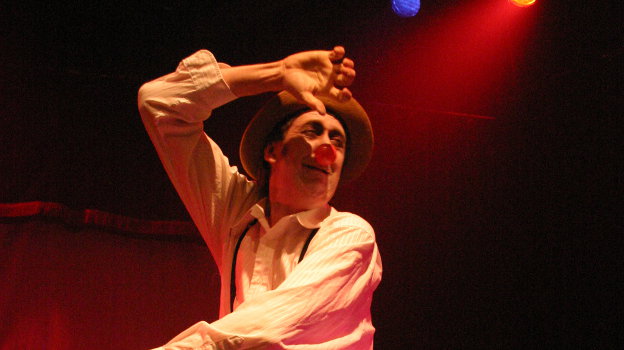Chris Cresswell’s persona in Qua Qua Qua, his homage to Jaques Tati, is a long, long way from the Chris Creswell who plays the booming frontman and impresario of the wacky high energy cabaret Voodoo Vaudeville, or from Creswell’s alter ego in that show, the unctuous and knowing Baby Warhol hand puppet, floating in a picture frame like a Surrealist Sooty. Qua Qua Qua‘s performance style is a much gentler, more intimate form of comedy, based firmly in the everyday and the confusions that may lie in the simplest of activities. Cresswell uses two of Tati’s main characters – Mr Hulot from Mr Hulot’s Holiday and other films, and the postman François, from Jour de Fête– as well as delivering an impersonation of the man himself. There are two angles here: one the exploration of Tati’s peculiar brand of humour, a kind of 1950s Mr Bean; the other taking in the wider subjects of theatre, the humour of the ordinary, and the humour of the moment itself.
The show begins with a loud crash, and a bicycle wheel rolling onto the stage: the postman has arrived. Cresswell is a tall, imposing man, having a stature which he uses to good effect in his louder MC acts in venues like the Spiegeltent, but a stature, too, which can be undercut by a shambling humility. It’s the perfect mix for the Tati characters. I also get the feeling that he is entirely in his skin in this kind of portrayal – it’s where his performing heart is. These characters have just the right mix of the bumbling gentle melancholy that facilitates comedy without cruelty. The audience is won over right from the start, ripples of laughter spreading through it.
Sounds are an important part of Tati films (for example the bouncing of the coffee pot in Mon Oncle, followed by the tinkling smash of the glass that doesn’t bounce – there are incidental sounds everywhere in his films). Inside the parcels that our postman delivers to the audience are items that create sound effects for many of Qua Qua Qua‘s scenes. I don’t like putting spoilers in reviews, so I won’t say exactly how it is done, but the entirely realistic sounds of typing on a manual typewriter are audience produced, as are those of rain and the flapping of a bird’s wings.
Most of the comedy is physical and visual – the tennis player facing the audience, with the thock of the tennis ball as the cue, is a great piece, slowly built up with facial expressions and whole body contortions. A testament to how good this is was the fact that occasionally the tennis moves seemed out of synch with the sound of the ball, but that didn’t matter – the movement and physical comedy overpowered such minor considerations.
The audience participation is good fun for both participants and those left behind: the ballet of the brooms, for instance, obtains its charm both from watching a volunteer drilled onstage, and from the celebration of this most prosaic of items, whether it is sweeping the stage or twirled like a slow-motion cheerleader’s baton.
A scene at a station brings in the rest of the cast, and again it’s a well played visual comedy of the everyday: the girl on the beach with the towel, another tennis player, another girl, another man, and of course beach balls that slowly settle on the stage, thrown from the wings, somehow intrinsically funny in themselves. The cast take on the mantle of this understated but expressive comic style very well, and it’s fun to watch.
One quibble would be the character of Jaques Tati himself as played by Cresswell in a not entirely convincing thick French accent (the Franglais was better). I wonder whether that would have been better played straight in Cresswell’s normal voice (as there’s enough communication and power in his physical presentation) or whether the accent needs hamming up even more.
Overall it’s an enthralling show with a slow, rolling pace that smoothly leads you into an entirely believable world where birds fly down and alight on one’s pipe. The key word is gentle – not in the English sense of gentle mocking comedy, but in the sense of a celebratory melancholy found in the everyday humour and sadness of things. It made me want to look at more of Tati’s work. His six films are undeniably strange from a 21st Century perspective, but I think this show gave me a greater insight into their slower, and that word again, gentler underlying comedy. Cresswell is taking risks in the show, improvising as necessary, and it works without working too hard; there’s no strain in the clowning. He was probably lucky to get an inordinately enthusiastic audience member for one part of the show, but then I think the atmosphere was such that this kind of participation would succeed anyway, and he has the skills to direct whoever appears on the stage.

